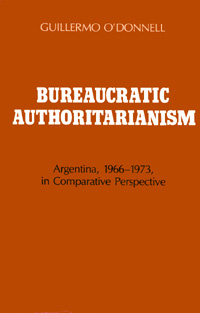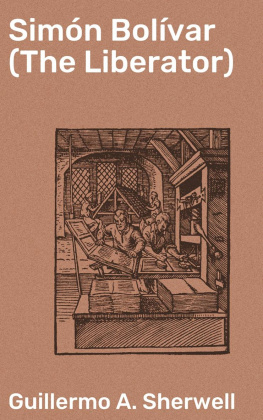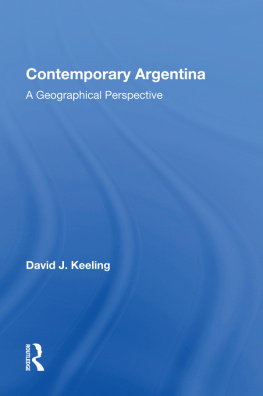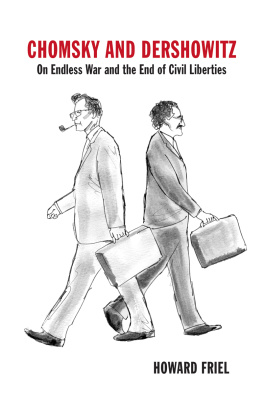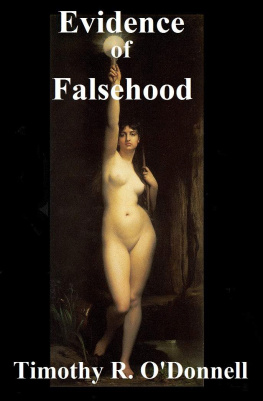Guillermo A. O’Donnell - Bureaucratic Authoritarianism: Argentina, 1966–1973, in Comparative Perspective
Here you can read online Guillermo A. O’Donnell - Bureaucratic Authoritarianism: Argentina, 1966–1973, in Comparative Perspective full text of the book (entire story) in english for free. Download pdf and epub, get meaning, cover and reviews about this ebook. City: Argentina., Berkeley, Calif., year: 1988, publisher: University of California Press, genre: Science / Politics. Description of the work, (preface) as well as reviews are available. Best literature library LitArk.com created for fans of good reading and offers a wide selection of genres:
Romance novel
Science fiction
Adventure
Detective
Science
History
Home and family
Prose
Art
Politics
Computer
Non-fiction
Religion
Business
Children
Humor
Choose a favorite category and find really read worthwhile books. Enjoy immersion in the world of imagination, feel the emotions of the characters or learn something new for yourself, make an fascinating discovery.
- Book:Bureaucratic Authoritarianism: Argentina, 1966–1973, in Comparative Perspective
- Author:
- Publisher:University of California Press
- Genre:
- Year:1988
- City:Argentina., Berkeley, Calif.
- Rating:5 / 5
- Favourites:Add to favourites
- Your mark:
- 100
- 1
- 2
- 3
- 4
- 5
Bureaucratic Authoritarianism: Argentina, 1966–1973, in Comparative Perspective: summary, description and annotation
We offer to read an annotation, description, summary or preface (depends on what the author of the book "Bureaucratic Authoritarianism: Argentina, 1966–1973, in Comparative Perspective" wrote himself). If you haven't found the necessary information about the book — write in the comments, we will try to find it.
Bureaucratic Authoritarianism: Argentina, 1966–1973, in Comparative Perspective — read online for free the complete book (whole text) full work
Below is the text of the book, divided by pages. System saving the place of the last page read, allows you to conveniently read the book "Bureaucratic Authoritarianism: Argentina, 1966–1973, in Comparative Perspective" online for free, without having to search again every time where you left off. Put a bookmark, and you can go to the page where you finished reading at any time.
Font size:
Interval:
Bookmark:
Preferred Citation: O'Donnell, Guillermo. Bureaucratic Authoritarianism: Argentina 1966-1973 in Comparative Perspective. Berkeley: University of California Press, c1988 1988. http://ark.cdlib.org/ark:/13030/ft4v19n9n2/
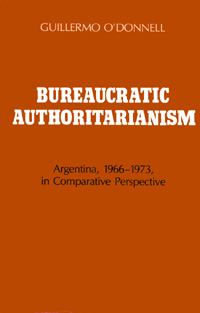 | Bureaucratic Authoritarianism Argentina, 19661973, in Comparative Perspective Guillermo O'Donnell Translated by James McGuire in collaboration with Rae Flory UNIVERSITY OF CALIFORNIA PRESS Berkeley Los Angeles Oxford 1988 The Regents of the University of California |
Preferred Citation: O'Donnell, Guillermo. Bureaucratic Authoritarianism: Argentina 1966-1973 in Comparative Perspective. Berkeley: University of California Press, c1988 1988. http://ark.cdlib.org/ark:/13030/ft4v19n9n2/
This book presents the findings of an empirical investigation into the political and economic processes in Argentina between June 1966 and March 1973. By interpreting these processes through concepts whose theoretical status is made explicit at the outset, and by comparing this case to analogous onesBrazil after 1964, Uruguay and Chile after 1973, and Argentina (again) after 1976the book is intended to advance the understanding of what I have termed the bureaucratic-authoritarian (BA) state, and on the basis of this understanding to analyze and critique the characteristics and consequences of this form of rule. In the course of the research that went into this book, it proved necessary to move back and forth across several levels of analysis and data, from the most structural to those related to the perceptions and ideological orientations of some key actors of the period. This shifting back and forth was costly in time and effort but indispensable for tracing a sequence of events that cannot properly be reduced to any single level of analysis.
Behind this book is a personal story. In 1971, as soon as I had finished my first book,[*] I began the research for the present one, using as a starting point interviews I had conducted between 1966 and 1968. The research was completed in late 1974, and by mid-1975 this book had assumed its present form. During that interval, however, events in
[*] Modernizacin y Autoritarismo (Buenos Aires: Editorial Paids, 1972). Published in English as Modernization and Bureaucratic-Authoritarianism (Berkeley: Institute of International Studies, University of California at Berkeley, 1973; second edition with postscript, 1979).
Argentina, together with the publication of another book[*] and several articles that I felt responded to more urgent concerns, prevented me from putting the finishing touches on the present work. Shortly thereafter the March 1976 coup, and the extraordinarily repressive regime it inaugurated, made it impossible to publish the book in Argentina. I might have published it in other languages, but it was not until recently, when it became possible again to publish it in Argentina, that I found the motivation to polish the version I had sadly shelved in 1976, update the footnotes, and prepare the present version for publication. This not-too-academic attitude was due in large part, I suspect, to another central motivationand hopeof this work: that it may serve as an informed argument about the immense costs (not only the ones inflicted on the bodies of those more dreadfully victimized) that we Argentines have exacted from ourselves as a result of the pervasive political violence and the recurrent attempts to establish authoritarian rule that have characterized the past decades. Such tragedies are commonplace in our time. Detailed study of the processes, errors, and passions that generated the one discussed here may be a useful undertaking, if only to demonstrate that at least this one was not unavoidable.
The book I would write today about the 196673 period in Argentina would be different from the one I wrote between 1974 and 1976. But it would not necessarily be better, since my current perceptions of that period are perhaps too heavily colored by subsequent events, particularly the extraordinary cruelty of the 197683 second Argentine BA. The crises and violence of the 196673 period pale in comparison to what unfolded after 1976. The reader, however, must try to view the present text in historical perspective, since that future was not in the minds of those who made the history of the 196673 years. What happened during that period, especially after 1969, was perceived as a confluence of crises, hopes, and fears entirely new to Argentine experience. If we ignore this crucial fact, we will not be able to comprehend why political actors behaved as they did before 1973, or especially how, and how much, such behavior contributed to what has occurred since then in Argentina.
This book has benefited from my discussions with many persons, in particular my colleagues and friends Fernando Henrique Cardoso, Marcelo Cavarozzi, David Collier, Shepard Forman, Albert Hirschman,
[*] Guillermo O'Donnell and Delfina Linck, Dependencia y Autonoma (Buenos Aires: Amorrortu Editores, 1973).
Sarah Hirschman, Helio Jaguaribe, Abraham Lowenthal, Cndido Mendes, Oscar Oszlak, Adam Przeworski, Philippe Schmitter, the late Kalman Silvert, and Francisco Weffort. I want to express my special gratitude to David Apter, Robert Dahl, and Alfred Stepan.[*] I wish also to acknowledge the many valuable contributions I received at the various places through which I wandered as a result of events in my country and in my personal life: the Centro de Estudios de Estado y Sociedad (CEDES) in Buenos Aires, the Institute for Advanced Studies at Princeton, the University of Michigan, the Instituto Universitario de Pesquisas de Rio de Janeiro (IUPERJ) and, most recently, the Helen Kellogg Institute at the University of Notre Dame. At various stages I received financial support from Yale's Office for Advanced Political Studies, the Danforth Foundation, the Council for Scientific and Technological Research in Argentina, the Guggenheim Foundation and the Carnegie Endowment for International Peace, and for the preparation of the present version, from the Helen Kellogg Institute. Support was also provided by CEDES, with funding supplied by institutional subsidies from the Ford Foundation and Sweden's SAREC. I extend my deepest gratitude to the persons and institutions involved. persons and institutions involved.
James McGuire has been much more than the translator of a difficult text by a difficult author; with exceptional dedication and talent, he made me aware of more than a few flaws in the Spanish version. Having struggled with other English translations of my very Hispanic writing, I was very fortunate that Grant Barnes, then of the University of California Press, invited an excellent scholar like McGuire to undertake this one.
To my loves, past and present, my apologies for the more than a few moments that this book stole from us, and my thanks for their support.
One final word. Interviews with many of the most important actors of the period were an indispensable source for this book, since they enabled me to understand the significance of certain episodes and to
[*] This community of colleagues and friends includes William Smith, who arrived in Argentina in 1974 to do research toward his doctoral dissertation at Stanford University. By that time I had basically completed my research and was struggling with the first draft of this book. Since Smith's project focused on the same period as my own, and since our approaches were quite similar, we engaged in frequent and fruitful discussions. When Smith returned to the United States, we agreed to safeguard the identity of each text by refraining from reading the other's until both had been completed. The product of Smith's research is "Crisis of the State and Military-Authoritarian Rule in Argentina, 19661973" (Ph.D. diss., Stanford University, 1980). This work is an excellent contribution to the study of Argentina and to the theory of authoritarian forms of rule. In spite of the coincidences, Smith and I gave different emphases to our texts, making them much more complementary than overlapping.
Font size:
Interval:
Bookmark:
Similar books «Bureaucratic Authoritarianism: Argentina, 1966–1973, in Comparative Perspective»
Look at similar books to Bureaucratic Authoritarianism: Argentina, 1966–1973, in Comparative Perspective. We have selected literature similar in name and meaning in the hope of providing readers with more options to find new, interesting, not yet read works.
Discussion, reviews of the book Bureaucratic Authoritarianism: Argentina, 1966–1973, in Comparative Perspective and just readers' own opinions. Leave your comments, write what you think about the work, its meaning or the main characters. Specify what exactly you liked and what you didn't like, and why you think so.

